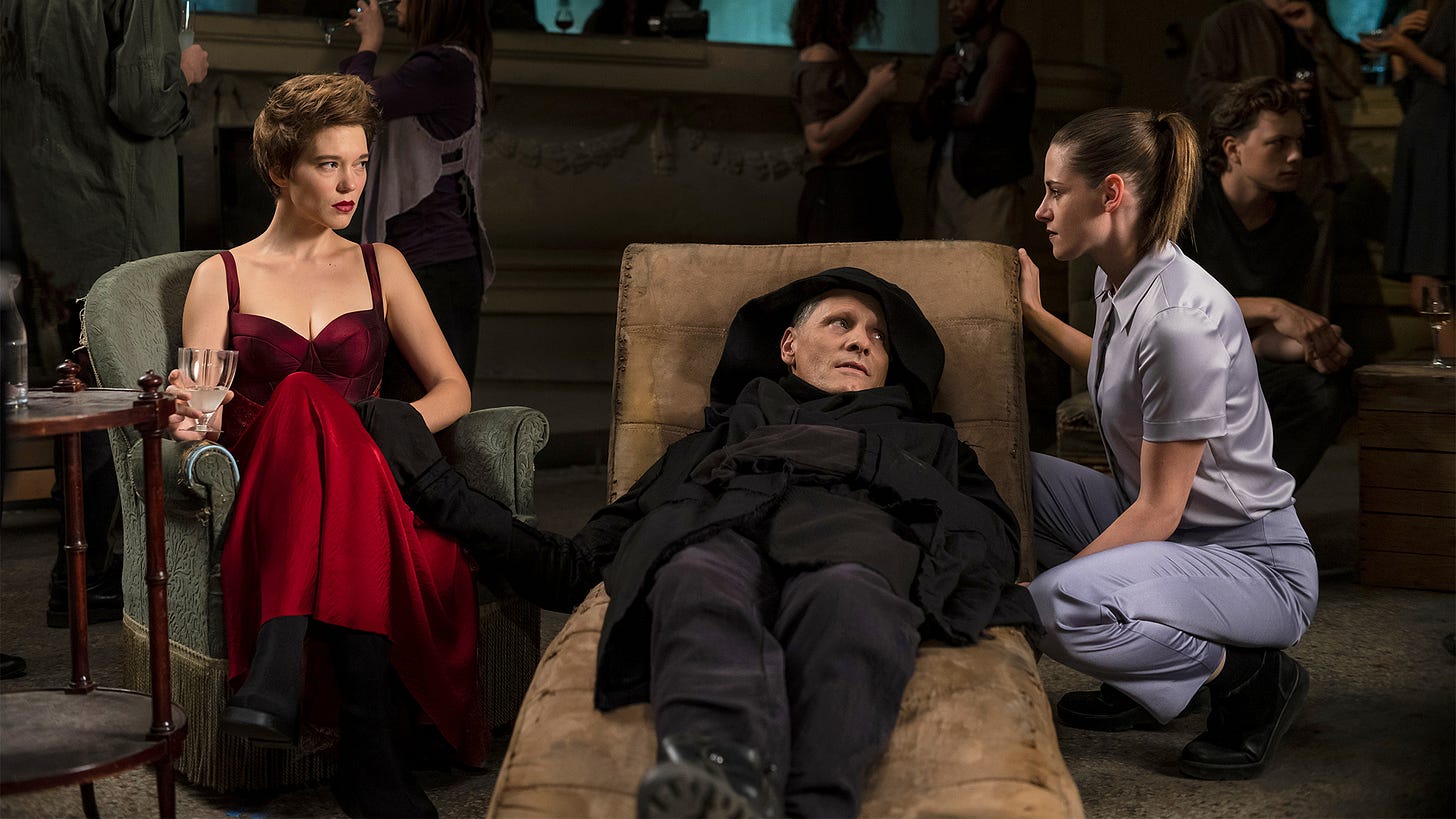Cronenberg and the Same New Queer Flesh
Crimes of the Future revisits the cutting edge body horror that isn't so cutting edge anymore.
Serendipity Point Films
Rating: 7/10 stars
David Cronenberg’s Crimes of the Future has been a polarizing film. It prompted both walkouts at Cannes, and a 7-minute standing ovation.
All of which leaves you wondering if Cannes audiences have somehow missed every other film by David Cronenberg over the last 45 years. Crimes of the Future is so David Cronenberg a David Cronenberg film that it’s hard to believe anyone would be shocked, thrilled, or even minimally surprised. At times, the movie almost seems like self-parody or self-pastiche. You’ve got the monstrous birth (The Fly); new twisted orifices (Dead Ringers, Videodrome), sex with machines (Crash, EXistenZ), bizarre espionage (Naked Lunch) and intimations of kinky S&M (everything he’s ever done.)
As per many a David Cronenberg film past, this one is set in a grungy near-future of proliferating quasi-organic machinery. Humans have evolved past the ability to feel pain, and some are growing organs of indeterminate shape and function. Sexually charged body performance art is the latest hip pop fashion, and the most famous stars in that realm is the duo of prolific new-organ grower Saul Tenser (Viggo Mortensen) and former trauma surgeon Caprice (Léa Seydoux). They are approached by Lang Daugherty (Scott Speedman), who wants them to do a public performative autopsy on his son. The boy was born with a digestive system that allows him to consume plastic.
Against this openly absurd not-plot, Cronenberg explores his favorite themes of deviance/normality, repulsion/ desire, and the body as site of meaning. Kristen Stewart, in a wonderful bit part as Timlin, a tightly wound erotically quivering bureaucrat/fangirl, gets the line of the movie when she declares, “Surgery is the new sex.”
While these are ideas Cronenberg has been mulling over for years, they do take on a more pointed squelch in our current political climate. Cronenberg’s films have always flirted with queer themes. But now, with trans issues so visible, his fascination with and disgust at body alteration has an ideological resonance that it’s difficult to miss, though Cronenberg’s investment remains obscure. When Timlin throws herself at Saul and he begs off saying he’s bad at “the old sex” are we supposed to laugh at him for having lost touch with his humanity? For being a crotchety old fuddy-duddy unable to keep up with the youth and their desires? Both?
The artists, fans, and cultists who embrace the evolution of humanity and the sensuality of new bodies are presented with a mix of mockery, voyeurism, and horror. The forces of reaction, for their part, are murderous scolds, willing to murder their own children in the name of misguided purity. The unnatural is disgusting and provocative. The forces of repression are violent but attractive in their determined clarity.
More, the two opposing forces blur and interpenetrate, grafted one onto another by a sexy surgeon’s knife. Saul, for example, is a double or triple agent, rapturously cultivating his new organs and then slicing them out in the name of health and human normality. The technicians who service Saul’s hormone regulating bed practically drool with lust all over the body-penetrating and altering technology. But they also have a mysterious violent reactionary agenda.
Cronenberg loves and hates new bodies, new pleasures, new sex, queer panic and queer ecstasy. The love and hate, and for that matter the bodies, pleasures, sex, panic, and ecstasy, are all fairly abstract though. They’re ideas to play with for the filmmaker as Important Thinker and futurist. Cronenberg recognizes he’s Saul—a slightly ridiculous, self-indulgent artist who is disgusted by his own intertwined body and art. But recognizing he’s Saul doesn’t stop him from being Saul.
If you want to see who Cronenberg might be if he could get a new body and a new self, you should probably watch, not Crimes of the Future, but the 2021 film Titane. Its director, Julia Ducournau, took Cronenberg films to a place Cronenberg has never been able to go.
Viggo Mortensen uncharitably said that Titane was inferior to Cronenberg’s work because it was “just about superficial shock value and unconventional imagery.” But the real difference is that where Cronenberg is fascinated with queerness as a trope, Ducournau actually cares about queer people. Her protagonist Adrien (Agathe Rouselle) isn’t some metaphorical stand-in for the meaning of the body. She’s a particular person, with a particular body, which shapes her and which she struggles to shape into something that has meaning for her.
Cronenberg obviously influenced Ducournau; she’s said his work was “foundational”. She’s learned from him and made something new and twisted from the organs he gave her. Cronenberg, though, keeps putting the internal bits into the same flesh sack. As a result, his latest movie, for all its considerable virtues, feels, not like an exciting, dangerous future crime, but like something he’s committed before.
first published June 2022


